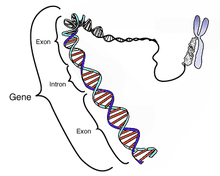Genesis (Star Trek: The Next Generation)
| "Genesis (Star Trek: The Next Generation)" |
|---|
"Genesis" is the nineteenth episode of Star Trek: The Next Generation's seventh season, which first aired on March 19, 1994. Captain Jean-Luc Picard and Data return to the USS Enterprise to discover the rest of the crew de-evolved into more primitive forms of life, including spiders, amphibians and cave men.[1] The episode is the first and only to be directed by Gates McFadden,[2] who portrayed Dr. Beverly Crusher, and was written by Brannon Braga.[3]
Cast
Regular cast:
- Patrick Stewart – Captain Jean-Luc Picard
- Jonathan Frakes – Commander William T. Riker
- LeVar Burton – Lt. Commander Geordi La Forge
- Michael Dorn – Lieutenant Worf
- Gates McFadden – Doctor Beverly Crusher
- Marina Sirtis – Counselor Deanna Troi
- Brent Spiner – Lt. Commander Data
Guest cast:
- Patti Yasutake – Nurse Alyssa Ogawa
- Dwight Schultz – Lieutenant Reginald Barclay
- Carlos Ferro – Ensign Dern
- Majel Barrett – Enterprise Computer
Synopsis
The given stardate is 47653.2,[1] the year 2370.[4] Worf fires a torpedo that veers off course during weapons exercises, and Picard and Data leave in a shuttlecraft in order to retrieve it from space.[5] Data leaves his pregnant cat, Spot, with Barclay. Barclay, a hypochondriac, visits Crusher, who gives him a synthetic T-cell to activate one of his dormant genes. However it has the undesired side-effect of activating all his dormant introns. The crew begin to experience strange symptoms.[4] Worf becomes aggressive and feels hot, while Deanna Troi feels cold. Crusher examines a silent Worf in sick bay and notices a venom sac on his neck, whereupon Worf sprays venom (it is not clear if this is inadvertently or deliberately) at Crusher, injuring her severely. As a result of her injuries, Crusher is placed into stasis.[3]
Several days later, when they have retrieved the torpedo from space, Picard and Data return to find the ship adrift, with the main power off-line. One of the bridge officers is dead, torn open in his seat,[6] and most of the crew are de-evolving. Worf has reverted into an aggressive predator attempting to mate with Troi; Riker a caveman; Troi an amphibian; and Barclay a spider.[3] Picard is overcome by irrational emotions of fear and anxiety, indicating that he has been infected, and Data suggests he might soon de-evolve into a primate similar to a lemur or marmoset. Picard and Data return to Data's quarters and find Spot and her kittens. Spot herself has changed into an iguana, however the kittens are normal.[7] Data recommendeds that they locate Nurse Alyssa Ogawa who is recently pregnant. While in sickbay, Worf attempts break through the doors searching for Troi. Data concocts a pheromone spray from one of Troi's sebaceous glands, and Picard uses it to distract Worf and lead him off through the ship, so Data can work on the cure. Worf eventually catches Picard in a narrow crawlspace and the Captain uses a power cable to incapacitate him. Meanwhile, Data finishes the construction of the modified retro-virus and releases it into the air which returns everyone to their original state. At the conclusion, Crusher names the condition 'Barclay's Protomorphosis Syndrome', after its first sufferer.[3][4]
Reception

Genesis employs heavy make-up use, and 1994 saw 10 Emmy nominations for The Next Generation for Outstanding Individual Achievement in Makeup for a Series. This includes one for Michael Westmore,[8] who served as the make-up supervisor for Genesis.[9]
Notes
- ^ a b Okuda, p. 170-171.
- ^ "Gates McFadden". IMDB. Retrieved 2009-07-15.
- ^ a b c d "Star Trek: The Next Generation: Genesis (1994)". StarTrek.com. Retrieved 2009-07-16.
- ^ a b c Okuda, p. 33-34.
- ^ "Star Trek: The Next Generation: Genesis (1994)". IMDB. Retrieved 2009-07-15.
- ^ Okuda, p. 113.
- ^ Okuda, p. 460.
- ^ "Awards for Star Trek: The Next Generation". IMDB. Retrieved 2009-07-16.
- ^ "Full cast and credits for Star Trek: The Next Generation: Genesis (1994)". IMDB. Retrieved 2009-07-16.
References
- Okuda, Michael (1999). The Star Trek Encyclopedia. A Reference Guide to the Future. Denise Okuda, Debbie Mirek (2rd Edition ed.). Pocket Books. ISBN 0671536095.
{{cite book}}:|edition=has extra text (help) - Erdmann, Terry, J. (2008). Star Trek 101. Paula M. Block. Simon & Schuster. ISBN 0743497236.
{{cite book}}: CS1 maint: multiple names: authors list (link)
